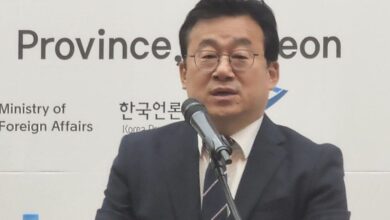Int’ NGO urges Cambodian government to fight against human trafficking
Phnom Penh: An international non-governmental organization on Thursday urged the Cambodian government to take action against human trafficking as it is involving serious violation of human rights and negatively effects on economic development.
Speaking in her remarks at a meeting to present research findings on Sex and Labor Trafficking Network and Pattern in Cambodia, Country Director of Winrock International Sara Piazzano said it is the duty of the government and development organizations to provide people the right to access to information and alternatives in order to avoid becoming victim of human trafficking.
Under phase two of the Counter Trafficking in Persons Program funded by USAID, Winrock International conducted research on the patterns of trafficking in person in order to facilitate involved ministries and other non-government organizations to develop appropriate prevention campaigns for all forms of trafficking in person.
The objective of the research is to obtain the most recent information regarding the human trafficking situation in Cambodia, particularly labor trafficking, as well as interventions currently in place to prevent this phenomenon.
Sara said the research will help shape more effective prevention strategies to curb human trafficking in the country. Part of the research finding is that the victims of trafficking often had low education and lack of information about safe migration before the fall into trafficking, she added.
Sharing her comment with the meeting, Prak Chantha, Secretary of State in the Ministry of Labor and Vocational Training, said migrants often had limited knowledge and little education which were vulnerable and exposed to the trafficking.
“Some of them even don’t finished primary education and some are illiterate so our messages (of the risk of migration) cannot penetrate them and our information campaign hardly reaches community level,” she said.
The research found that when awareness about human trafficking is very high (85-100%) source of awareness differ between the segments. One third of survivors don’t have access to mass media and two thirds don’t have a mobile phone. Hence, they become more dependent on word of mouth communication when it comes to trafficking in person (TIP) information. It is therefore not surprising that exposure to past TIP interventions is lower for survivors (20%) compared to vulnerable groups (27%) and migrants (25%). Another interesting difference is that around one third in each group know a relative or friend who has migrated, however, nearly all cases of unsafe migration were friends and relatives of survivors.
The research found that whilst education and food security stood out as the two key vulnerability factors, survivors were also found to have experienced vulnerability triggers to a much greater extent. Vulnerability triggers are defined as events which may be sudden and cannot be controlled such as natural disasters and disease. Survivors have on average experienced nearly three and a half different vulnerability triggers in the past 12 months compared to just two for v returned migrants. Illness, debt, natural disaster, school dropout, and family split up were vulnerability triggers that stand out.
Nearly half (47%) of the survivors interviewed could not always afford to buy food compared to 24 percent for the other groups and highlight issues of food security. Even though two thirds own land to grow rice, they had to buy rice 7 months in a year on average compared to just three months for the vulnerable group, according to the research.
Sara said it was important to develop more job opportunities and better assistance in rural areas, as well as to simplify the way to migrate and work legally in neighboring countries.
“Migrants need to know where to seek information and the process to migrate need to be short, simple and at low cost,” she said.
She said people need to work together to implement existing law and show commitment in preventing human trafficking, support the victims and prosecute the criminals.
The number of criminals prosecuted for trafficking in person in Cambodia is still very low and services to support the victims need to be improved in quality and in number, she concluded.
Winrock International organization through support of United States Agency for International Development (USAID) is implementing a project on counter trafficking in person for four years 2011-2015. (Cambodia News & Winrock: December 6, 2012)

